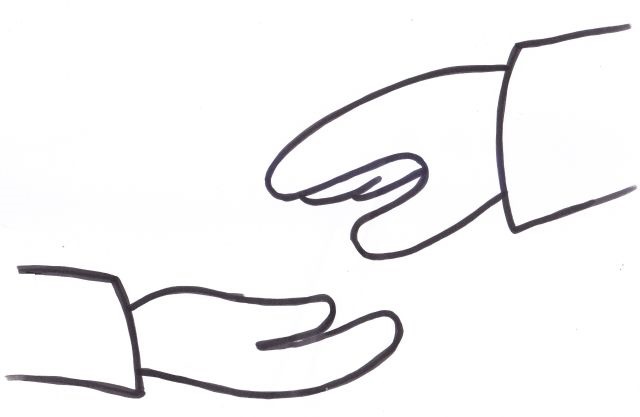Lend to your needy neighbor
Deuteronomy 15:7-8
> debt is not in principle evil or prohibited
> but debt can turn evil > dependency > bondage.
> but there is a right way to lend, for God would not command this otherwise
> lending, not outright giving
> not: give to whoever asks
> lending = plan to pay money back (small amounts … over time)
> if one of your brothers should become poor…somebody fallen into need of difficulties
> to people in need, not people ‘in want’
> to cover essentials, not luxuries
> Bank credit advertisements? > new honda, new car, new sofa set …. creating new desires
> desires are created, which you can fulfill them at the price of dependency


s
Lending means to get money now, but to pay it back eventually according to an agreed plan. The expenses for the thing are relegated to the future.
> this means that during pay back I will have to meet the daily needs plus the pay back amount
> this cannot ever work unless the loan is used to create or increase my abiity to generate money > with that increased income I can cover both, needs & pay back > therefore lending has to be ‘productive’
> Example: Sewing machine, Rickshaw
> if not lending becomes a sure trap, a pathway to bondage
> one of your brothers / to the needy neighbor / one of your community
What does brother or neighbor mean?
> somebody you know, you have relationship with, whose need you know
> somebody you know & have relationship with > social pressure > accountability
> Example: farmer whose house burnt down
> Counterexample: beggars, whose actual situation I know nothing about In modern language: give Micro credit!
> small productive loans from a fund run by people who know each other
> Dr. Younus got the Nobel prize, but his idea is not new, but 3400 years old
> Maybe God should get the Nobel prize?
> Truth is never ‘new’ … but truth always works, then and now
Some practical examples
Buying a fridge from a showroom: Say the prize of the fridge is 30’000 Taka if I buy it in cash now. Installment system: if paid off withing 4 months then the total cost of the fridge comes to 32’961 Taka (+10%). if paid off within 9 months then the total cost of the fridge is 35’100 Tk (+17%). If I can’t afford the fridge now with today’s daily expenses, how can I afford a 17% more expensive fridge with the future daily expenses (which will definitely not be less!)?
Taking out a 100 Taka loan from a Bank or a Somitee: within 10 ½ months I will have to pay back the loan and an additional 15% (15 Taka). The yearly interest rate is above 15%.
Taking out a loan of 100 Taka from a private person in the village. Often the stipulated pay interest is as high as 10 Tk per month, even 20 Taka per month. This amounts to a yealy interest rate of 120%-240%. It is almost impossible pay off a loan under these conditions. In many countries interest rates above 12% are illegal (!).
Regular cancellation of Debts
Deuteronomy 15:1-2
Debts must be canceled regularly
Debts / loans are not prohibited but debts must be time-limited … 7 years maximum.
> no never-ending debt repayment
> no people getting deeper and deeper into the debt cycle
> reduces the amount loaned >otherwise no reasonably achievable payback
> reduces the length of ruination (not permanent)
> ensures chance to recover from financial disasters
regular chance for a new beginning
> debt will not pass on the next generation
> don’t have to pay for parents mistakes
> new chance for each new generation
> God wants a chance for fresh starts, not very fast, but quite fast
> you are not bound to past failures forever
> encourages risk taking > safety net for business initiatives
Jesus’ title is ‘Alpha’, the God of forgiveness, God of new beginnings (Rev 1:8)
Protection of the Creditor and Accountability of the Debtor before God
God commands the faithful payback of debts, dues, agreements:
Ps 37:21 “The wicked borrow and do not repay”
Pr 3:28 “Do not say to your neighbor, ‘Come back later; I’ll give it tomorrow’ when you now have it with you”.
Rom 13:7 “Give everyone what you owe them: Pay your taxes and import duties, and give respect and honor to all to whom it is due”
Realize that debt presumes on the future and needs to be dealt with carefully:
Jm 4:13-14 “Now listen, you who say, ‘Today or tomorrow we will go to this or that city, spend a year there, carry on business and make money.’ Why, you do not even know what will happen tomorrow
Generous Creditor & Faithful Debtor Deuteronomy 15:9-10
“Take care lest there be an unworthy thought in your heart and you say, ‘The seventh year, the year of release is near,’and your eye look grudgingly on your poor brother, and you give him nothing, and he cry to the LORD against you, and you be guilty of sin. 10You shall give to him freely, and your heart shall not be grudging when you give to him, because for this the LORD your God will bless you in all your work and in all that you undertake.”
God challenges the Creditor to be generous and the Debtor to be faithful
God maintains right of the Creditor and the right of Debtor

Many of God’s laws protect foreigners … so why now this?
Foreigners do not own land > weaker economically > weaker in a society Do not interpret the Bible to mean that God is unjust, he isn’t. Why then this law?
Foreigners may disappear > lower security > unwillingness to grant loans > Maybe God is trying to make sure foreigners get loans at all
Am I equally responsibility for all people?
> If I am responsible for everybody I end up being responsible for nobody
> It can’t be done, it’s too heavy burden. God is fully realistic.
But I am responsible for some people. Levels of responsibility. See “FAM 14 – Financial Responsibility in the Family”
1 own spouse, own children 2 needy parents
3 neighbors, village, community 4 foreigners
Example: Your uncle needs a operation. Who needs to give?